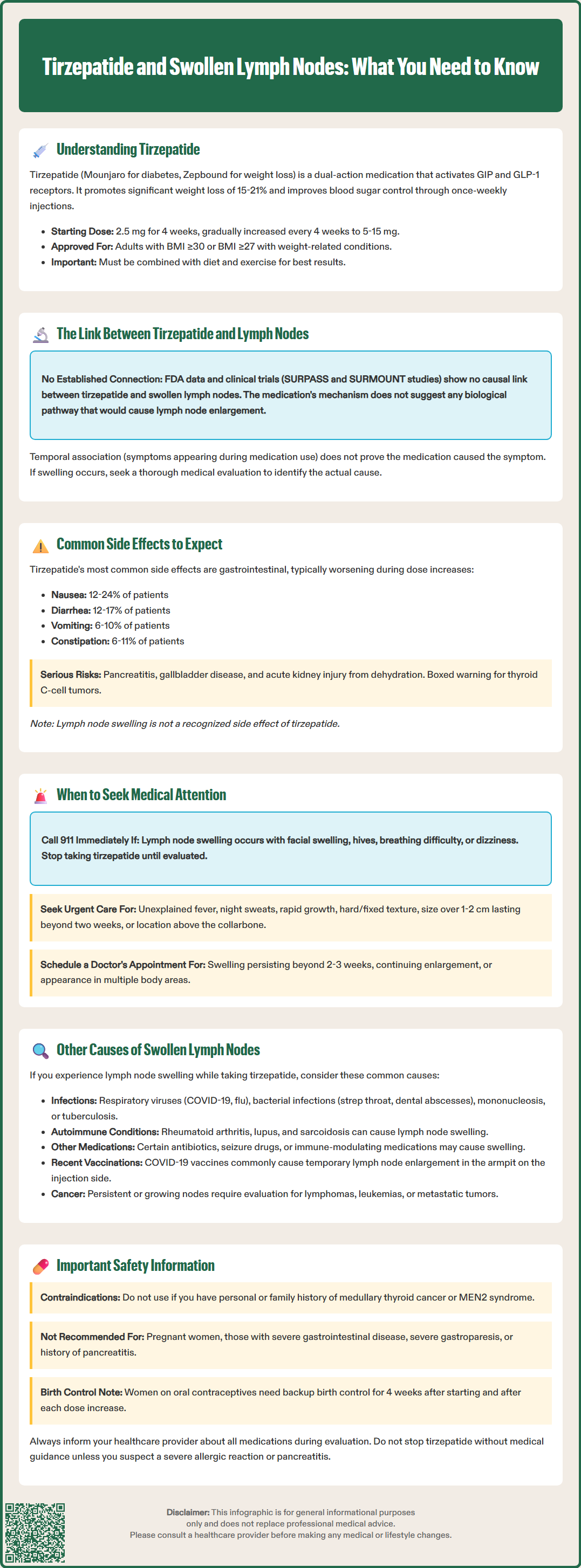LOSE WEIGHT WITH MEDICAL SUPPORT — BUILT FOR MEN
- Your personalised programme is built around medical care, not willpower.
- No generic diets. No guesswork.
- Just science-backed results and expert support.
Find out if you’re eligible

Tirzepatide (Mounjaro, Zepbound) is an FDA-approved dual GIP/GLP-1 receptor agonist used for type 2 diabetes and chronic weight management. While patients may occasionally notice swollen lymph nodes during treatment, current clinical trial data and FDA prescribing information do not establish tirzepatide as a recognized cause of lymphadenopathy. Understanding the medication's documented side effect profile—predominantly gastrointestinal symptoms—and recognizing when lymph node swelling requires medical evaluation helps patients and clinicians distinguish medication-related effects from unrelated conditions requiring investigation.
Quick Answer: Tirzepatide is not established as a cause of swollen lymph nodes based on FDA-approved prescribing information and clinical trial data.
Tirzepatide is a dual glucose-dependent insulinotropic polypeptide (GIP) and glucagon-like peptide-1 (GLP-1) receptor agonist approved by the FDA for the treatment of type 2 diabetes mellitus (Mounjaro) and chronic weight management (Zepbound). For weight management, tirzepatide is indicated for adults with a BMI ≥30 kg/m² or ≥27 kg/m² with at least one weight-related comorbidity, and must be used in conjunction with a reduced-calorie diet and increased physical activity.
The medication works through a dual mechanism of action by simultaneously activating both GIP and GLP-1 receptors. This dual agonism enhances insulin secretion in a glucose-dependent manner, suppresses glucagon release when blood glucose levels are elevated, and slows gastric emptying. These combined effects result in improved glycemic control and significant weight reduction.
Tirzepatide is administered as a once-weekly subcutaneous injection, with dosing typically initiated at 2.5 mg for 4 weeks (a non-therapeutic initiation dose to improve tolerability), then increased every 4 weeks to reach a therapeutic dose of 5-15 mg weekly based on response and tolerability. Clinical trials have demonstrated substantial reductions in hemoglobin A1c levels (up to 2.5% reduction) in type 2 diabetes, while weight management trials showed 15-21% weight loss in adults with obesity without diabetes.
Important safety information includes a boxed warning for risk of thyroid C-cell tumors. Tirzepatide is contraindicated in patients with a personal or family history of medullary thyroid carcinoma (MTC) or in patients with Multiple Endocrine Neoplasia syndrome type 2 (MEN2). The medication is not recommended during pregnancy, in patients with severe gastrointestinal disease including severe gastroparesis, or in those with a history of pancreatitis.

There is no established causal relationship between tirzepatide and swollen lymph nodes (lymphadenopathy) based on current FDA-approved prescribing information and clinical trial data. Lymph node swelling was not identified as a recognized adverse effect in the pivotal SURPASS trials for diabetes or the SURMOUNT trials for weight management. The FDA labels for Mounjaro and Zepbound do not list lymphadenopathy among documented side effects.
However, it is important to acknowledge that post-marketing surveillance and real-world clinical experience continue to monitor for adverse events not detected in controlled trials. Individual case reports or patient experiences may occasionally describe lymph node swelling during tirzepatide treatment, but such occurrences do not necessarily indicate causation. Temporal association—where a symptom appears during medication use—does not prove the medication caused the symptom.
The mechanism of action of tirzepatide does not suggest a biological pathway that would directly cause lymph node enlargement. However, rare hypersensitivity reactions to any medication, including tirzepatide, could potentially present with lymphadenopathy. If lymph node swelling occurs with signs of a serious allergic reaction (rash, hives, facial/tongue swelling, difficulty breathing), patients should seek emergency medical care immediately and hold the medication pending evaluation.
Patients experiencing swollen lymph nodes while taking tirzepatide should not automatically attribute this symptom to the medication. A thorough clinical evaluation is essential to identify the actual cause. Healthcare providers and patients can report suspected adverse reactions to the FDA MedWatch program.
The most frequently reported adverse effects of tirzepatide are predominantly gastrointestinal in nature, reflecting the medication's mechanism of action on GLP-1 receptors in the digestive system. Understanding these common side effects helps distinguish them from unrelated symptoms such as lymph node swelling.
Common gastrointestinal side effects include:
Nausea: Occurs in 12-24% of patients, varying by dose and indication; usually most pronounced during dose escalation
Diarrhea: Affects 12-17% of patients, typically mild to moderate in severity
Vomiting: Reported in 6-10% of patients, more common at higher doses
Constipation: Occurs in 6-11% of patients
Abdominal pain and dyspepsia: Generally transient
Decreased appetite: An expected pharmacological effect contributing to weight loss
Other documented adverse effects include injection site reactions, hypoglycemia (when used with insulin or sulfonylureas), and less commonly, fatigue. Serious risks include pancreatitis (stop medication and seek immediate medical attention for severe abdominal pain radiating to the back), gallbladder disease, acute kidney injury (typically secondary to dehydration from gastrointestinal symptoms), and hypersensitivity reactions.
Tirzepatide carries a boxed warning for risk of thyroid C-cell tumors and is contraindicated in patients with a personal or family history of MTC or with MEN2. Women using oral contraceptives should use a backup method for 4 weeks after tirzepatide initiation and each dose increase due to potential reduced contraceptive effectiveness.
Lymph node swelling is notably absent from this profile of recognized adverse effects. When patients experience swollen lymph nodes during tirzepatide treatment, clinicians should conduct a comprehensive differential diagnosis rather than assuming medication causation.
Swollen lymph nodes require medical evaluation to determine their underlying cause, regardless of whether a patient is taking tirzepatide or any other medication. Certain characteristics of lymphadenopathy warrant prompt or urgent medical attention.
Seek immediate medical evaluation if swollen lymph nodes are accompanied by:
Systemic symptoms: Unexplained fever, drenching night sweats, or unintentional weight loss (beyond expected tirzepatide-related weight reduction)
Rapid enlargement: Lymph nodes that grow quickly over days to weeks
Hard, fixed, or irregular nodes: Lymph nodes that feel firm, immobile, or matted together
Size: Nodes larger than 1-2 cm (approximately half an inch to one inch) that persist beyond two weeks
Location: Supraclavicular (above the collarbone) lymphadenopathy, which has higher association with serious pathology
Associated symptoms: Difficulty breathing, swallowing, or persistent cough; unexplained bruising or bleeding; severe fatigue
Call 911 or seek emergency care immediately if lymph node swelling occurs with signs of anaphylaxis or severe allergic reaction (facial/tongue swelling, hives, difficulty breathing, dizziness). Hold tirzepatide pending medical evaluation in this situation.
Patients should schedule a routine medical appointment for lymph node swelling that is persistent (lasting more than 2-3 weeks), progressively enlarging, or occurring in multiple body regions simultaneously. Even in the absence of alarming features, unexplained lymphadenopathy merits clinical assessment.
During evaluation, healthcare providers will conduct a thorough history and physical examination, including assessment of all lymph node regions. It is essential that patients inform their healthcare provider about all medications, including tirzepatide. Patients should not discontinue tirzepatide without medical guidance, except in cases of suspected severe allergic reactions or pancreatitis, where holding the medication pending urgent evaluation is appropriate.
When lymph node swelling occurs during tirzepatide treatment, numerous alternative explanations should be considered. Lymphadenopathy is a common clinical finding with a broad differential diagnosis.
Infectious causes are the most frequent etiology of lymph node swelling. Upper respiratory tract infections, including viral pharyngitis, influenza, and COVID-19, commonly cause cervical lymphadenopathy. Bacterial infections such as streptococcal pharyngitis, dental abscesses, or skin infections can produce regional lymph node enlargement. Systemic infections including Epstein-Barr virus (infectious mononucleosis), cytomegalovirus, toxoplasmosis, HIV, tuberculosis, cat scratch disease (Bartonella), and certain sexually transmitted infections should be considered based on clinical context and risk factors.
Inflammatory and autoimmune conditions can manifest with lymphadenopathy. Rheumatoid arthritis, systemic lupus erythematosus, and sarcoidosis may present with generalized or regional lymph node enlargement. Some patients with obesity and metabolic syndrome—the population commonly prescribed tirzepatide—may have underlying inflammatory conditions that coincidentally become apparent during treatment.
Malignant causes require consideration, particularly in patients with persistent or progressive lymphadenopathy. Lymphomas (Hodgkin and non-Hodgkin), leukemias, and metastatic solid tumors can present with lymph node enlargement. Risk assessment should consider patient age, smoking history, and presence of constitutional symptoms.
Medication-related lymphadenopathy can occur with various drugs. Other medications the patient may be taking—including certain antibiotics, anticonvulsants, or immunomodulatory agents—should be reviewed.
Reactive lymphadenopathy from recent vaccinations is increasingly recognized, particularly following COVID-19 vaccination, which can cause axillary lymph node enlargement on the ipsilateral side. Patients should report recent immunizations during medical evaluation. A systematic approach to diagnosis will typically identify the underlying cause of lymph node swelling, which is often unrelated to tirzepatide therapy.
Healthcare providers and patients who suspect an adverse reaction to tirzepatide should report it to the FDA MedWatch program.
No, lymph node swelling (lymphadenopathy) is not listed as a recognized adverse effect in FDA-approved prescribing information for tirzepatide (Mounjaro or Zepbound) and was not identified in pivotal clinical trials. If swollen lymph nodes occur during treatment, a thorough medical evaluation is needed to identify the actual cause.
The most common side effects of tirzepatide are gastrointestinal, including nausea (12-24%), diarrhea (12-17%), vomiting (6-10%), constipation (6-11%), and decreased appetite. These effects typically occur during dose escalation and are generally mild to moderate in severity.
Seek immediate medical attention if swollen lymph nodes are accompanied by fever, night sweats, rapid enlargement, hard or fixed nodes, nodes larger than 1-2 cm persisting beyond two weeks, or signs of allergic reaction such as difficulty breathing or facial swelling. Any persistent or unexplained lymphadenopathy warrants clinical evaluation.
All medical content on this blog is created using reputable, evidence-based sources and is regularly reviewed for accuracy and relevance. While we strive to keep our content current with the latest research and clinical guidelines, it is intended for general informational purposes only.
This content is not a substitute for professional medical advice, diagnosis, or treatment. Always consult a licensed healthcare provider with any medical questions or concerns. Use of this information is at your own risk, and we are not liable for any outcomes resulting from its use.